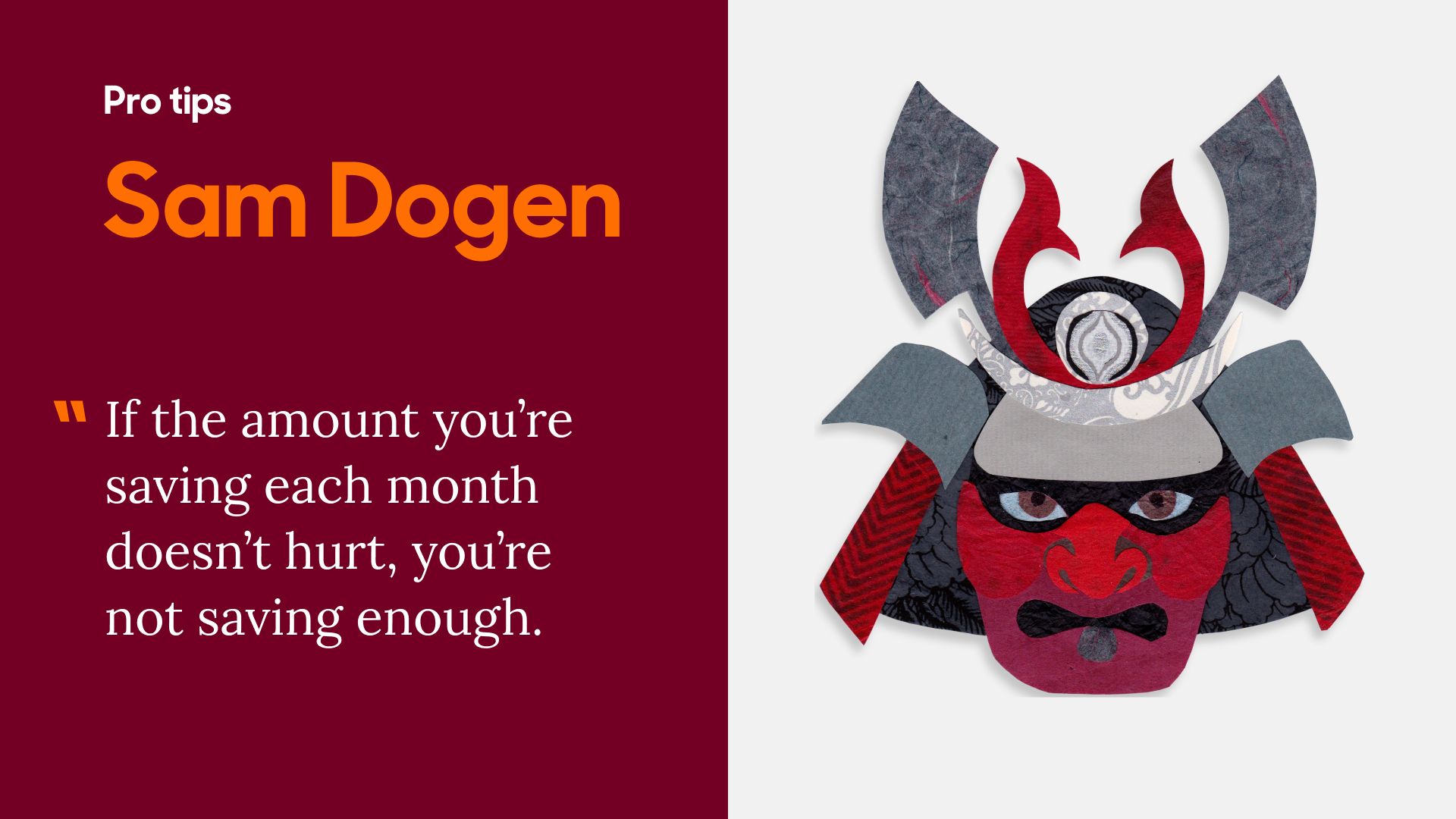Sam Dogen started Financial Samurai, a personal finance blog, in 2009 to help make sense of the financial crisis. That year he lost more than a quarter of his net worth. Despite the setback, he bounced back. In 2012 he took a leap of faith: He left his company and retired early. We caught up with Dogen about his relationship with money, his predictions for economy and his advice on retiring early. Hint — it involved passive income.
Want alerts about our Pro Tip profiles? Sign up for our Easy Money newsletter, sent to your inbox each Friday.
This interview has been lightly edited for style and clarity.
How did the recession of 2007 to 2009 impact your relationship with money?
I lost about 35% of my net worth in just six short months in 2009. I thought I had done everything right, diversifying my net worth in stocks, bonds, real estate and certificates of deposit. I saved 50% or more of my income every year. Further, I worked in finance. However, I still got rocked.
The experience reminded me not to confuse brains with a bull market. Losing lots of money made me focus more on risk management. Before the financial crisis, I was too confident about my investments and my career.
The crisis also finally pushed me to start Financial Samurai, a site that I had wanted to start since 2006 after I graduated from business school at Berkeley.
Why is it important to have a good relationship with money?
Everybody needs to adopt a strong money mindset. Abolish welfare mentality and believe you deserve to be rich! San Francisco Muni janitors are making over $200,000 a year. Why can’t you? There are CEOs who get multi-million pay packages, yet drive their companies into the ground. When they are let go, they get millions more in severance!
Once you start believing you deserve to be rich, more financial opportunities will start coming to you. You will take more calculated risks and figure out ways to use money as a means to a better life.
What’s your take on the state of our economy?
I believe there will be a 25% to 30% rebound in S&P 500 earnings in 2021. I expect mortgage rates to continue to stay low, thereby providing a tailwind for the real estate market. With an accommodative Federal Reserve and a new government looking to provide as much stimulus money as possible, it’s hard not to be bullish.
I’m particularly positive on buying rental properties because the value of rental income has gone way up with interest rates way down. It takes a lot more capital to produce that same amount of risk-adjusted income today. The intrinsic value of real estate has also gone up because we’re spending so much more time at home.
Further, I believe there will be a return to big city living again post-herd immunity. In San Francisco, for example, there have been huge initial public offering successes with Affirm and Airbnb recently. These winners will create more winners due to the network effect. Further, some of the liquidity will flow to big city real estate. I’m a buyer of big city real estate before the herd comes back. If you plan to rent, try and lock in as long of a lease as possible. Rents will be going up again.
What advice do you have for people who are struggling financially?
Nothing good or bad lasts forever. Therefore, if you are struggling financially, focus on taking incremental steps to improve your wealth. Have the grit to keep on going.
Perhaps you may want to challenge yourself to see how much you can cut. Maybe you can look into starting an online side business now that we’re always at home. Or maybe you can reach out to a boss and ask what else you can do.
When you’re struggling, you must come up with a plan to improve your financial situation. Follow a process, such as sending five resumes a day. If the direction is correct, sooner or later you will get there.
How do you budget your money today?
I have a rough idea of my monthly budget. Once the big items are out of the way, housing, health care, food, insurance and transportation, everything else is pretty easy to mentally track. Instead of always focusing on the line items in my budget, I focus on trying to generate as much passive income as possible.
I left work in 2012 with $80,000 a year in passive investment income. When my wife, who is three years younger than me, retired in 2015, we focused on generating $150,000 to $200,000 in passive income. By focusing on the income part of the equation, the budget takes care of itself.
Read more about how Dogen makes passive income.
What advice do you have for someone who wants to retire early?
The first question to ask yourself is why you want to retire early. Saying you’re tired doesn’t count. There has to be something you are retiring to, such as wanting to be a stay-at-home parent.
I would also talk to other retirees and ask them what they would have done differently. I’ve shared some of the things I would do differently if I could retire all over again.
Because interest rates have fallen so much, it’s become harder to generate the same amount of risk-adjusted passive income. Therefore, it’s wise to develop some supplemental retirement income as well.
Early retirement won’t magically solve all your problems. Different problems will simply rise to the top. If you don’t retire with enough investment income to cover your desired living expenses, you may stress even more about money.
What’s your current money goal & how are you working toward it?
Our current goal is to try and generate $300,000 a year in consistent passive income to take care of a family of four. Our original goal was to generate $200,000 a year for my wife and I. Once we had our son in 2017, we bumped the goal up to $250,000. Once we had our daughter in 2019, we bumped the goal up by another $50,000.
We plan to live the rest of our lives in either San Francisco or Honolulu, two of the more expensive cities in the country. We also believe that inflation will keep making things more expensive. Therefore, we think earning $300,000 a year will provide for a relatively comfortable lifestyle. You can check out a $300,000 annual budget here. It’s not extravagant, especially if you have to pay $2,300 a month in health care insurance like we do.
Do you have any financial regrets?
Absolutely. I regret buying a vacation condo in 2007, despite getting 12% off from the seller’s purchase price. The condo proceeded to depreciate by another 50% and is still not back to even today!
Thankfully, the condo is only a small part of our net worth now. Further, I finally get to bring my two kids up to our place in Lake Tahoe. This was my original plan for buying the vacation condo all along. It just took much longer than expected to have kids!
What would you do with a $1 million windfall?
I would invest $300,000 in private real estate deals across the heartland of America. I think there’s a long-term demographic trend toward lower-cost areas of the country. Technology and the work-from-home trend are here to stay.
I would spend $50,000 on my parents to go on some amazing vacation once there is herd immunity.
I would donate $50,000 to the American Nystagmus Network, an organization that helps kids and adults with nystagmus, a visual impairment that prevents 20/20 visual acuity.
$200,000 would be invested in the S&P 500 index. $100,000 would go into my favorite stocks that I use every day.
I’ll keep the remaining $300,000 in cash just in case there are better opportunities.
What’s the best financial advice you’ve ever received?
Nobody will save you. You must save yourself. The best financial advice I like to give is this: If the amount you’re saving each month doesn’t hurt, you’re not saving enough.
What’s the worst financial advice you’ve ever received?
Buy a timeshare. Timeshares truly are a waste of money. Just book a hotel room or an Airbnb instead.
Image: Nastia Kobzarenko


